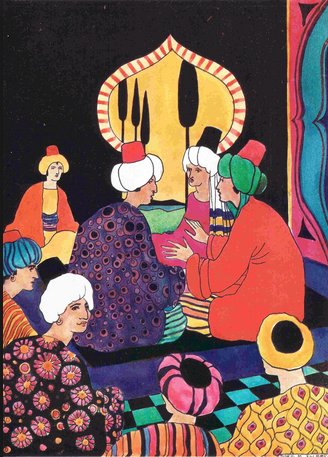 A couple of recent articles show that there is still a living interest in Khayyám’s rubáiyát, and that there is wide range of subjects and aspects left to be studied.
A couple of recent articles show that there is still a living interest in Khayyám’s rubáiyát, and that there is wide range of subjects and aspects left to be studied.
Rebecca Mueller, graduate student at Indiana University, published a paper “Balkan Rubaiyat”, in which she presents two case studies of post-Ottoman translation. The studies concern the translations by Safvet-Beg Bašağić (1870-1934), Omer Chajjam. Rubaije published in 1920, and by Theofan Stylian Noli (1882-1965), a version in Albanian, in 1926. Mueller’s aim is to discuss how these translations can be seen in the context of Western as well as Eastern orientation of Bosnian or Albanian indentity-formation in that period.
Balkan Rubaiyat. The post-Ottoman polysystem between East and West. Rebecca Mueller.
Online available at: http://www.academia.edu/7868153/Balkan_Rubaiyat_The_Post-Ottoman_Polysystem_Between_East_and_West.
D.P. May, from the Mathematics Department, Black Hills State University, Spearfish, takes a mathematical view on the Rubáiyát: how can graph theory be used to explore the connections between the various quatrains in FitzGerald’s translations.
Complete graphs in the Rubáiyát. D.P. May. Journal of Mathematics and the Arts, 8 (2014), nrs. 1-2, 59-67. DOI: 10.1080/17513472.2014.939526.
Rebecca Weston raised the question whether readers of Chinese and Persian poetry, notably by Li Bo, Khayyám or Hafez, should read between the lines when themes like ‘drunkenness’ or ‘drinking of wine’ occur. Drunkenness is not only a state of physical intoxication, but also refers to a state of spiritual enlightenment, and apart from the view that the reader takes in this discussion, Weston concludes that this unquestionably is an issue for “lengthy debate”.
Implications of Mystic Intoxication in Chinese and Iranian poetry. Rebecca Weston. The Undergraduate Historical Journal, 1 (2014), nr. 1.
Online available at: https://escholarship.org/uc/item/56m0j6zp
The recent translation into Dutch by Paul Claes, Omar Chajjaam. Kwatrijnen (2010) is discussed by Benoît Crucifix, student at Université catholique de Louvain. In this article, the author looks at quatrain nr. XI, to demonstrate the principles and theoretical ideas in Claes’ translation.
Woestijn waar ik dit paradijs aan dank. Claes vertaalt FitzGerald vertaalt Chajjaam. Benoît Crucifix. Filter, 21 (2014), nr. 2.
Abstract
And finally, Reza Taher-Kermani presents new insights into FitzGerald’s translation practice, to substantiate the claim that FitzGerald succeeded in transmitting an authentic Persian spirit in his Rubáiyát.
FitzGerald’s Anglo-Persian Rubáiyát. Reza Taher-Kermani. Translation and Literature, 23 (2014), 321-334. DOI:10.3366/tal.2014.0162